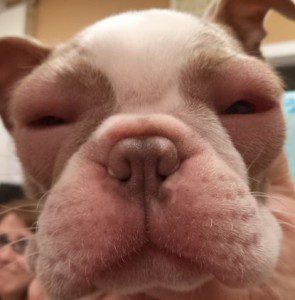Similar to people, pets can have allergic vaccine reactions too. These reactions range from mild to severe and in any case you should contact your veterinarian as soon as symptoms are noticed.
Mild symptoms might include:
Hives
Facial swelling
Redness around lips or eyes
Excessive scratching
Anorexia
Vomiting
Diarrhea
Lethargy
Difficulty breathing
Mild fever
Joint and muscle soreness
Uncontrolled bowel movements and urination
More severe symptoms might include:
Collapse
Seizures
Shock
Anaphylaxis
If your pet has an allergic reaction there are precautions to take before giving future vaccines. These may include pre-treating with antihistamines (doses should be recommended by your veterinarian), being sure your veterinarian is aware of previous reactions, avoiding giving several vaccines at one time and avoiding certain vaccines.
Jynx came to the Victoria Vet Clinic last year to receive her second puppy vaccination. She was a perfect little patient for her exam and vaccines. Her owner returned home with her, but soon after she noticed that Jynx’s face began to swell and she started having some difficulty breathing, so Jynx’s mom rushed her back to the clinic. Dr. Rymes treated her with appropriate medications which included an antihistamine and kept her for the afternoon in which time her facial and muzzle swelling dramatically subsided and her breathing improved. It was a very scary time for Jynx and her mom.
This year when Jynx came back for her yearly boosters we were all prepared. Jynx was pre-treated with an antihistamine and Dr. Rymes went over the benefits and risks of vaccinating with her mom. The benefits outweighed the risks so she received both of her vaccines. We were very happy to report that she did not have an allergic reaction this year!
For additional information on vaccine reactions visit Veterinary Partner
Visit Website






